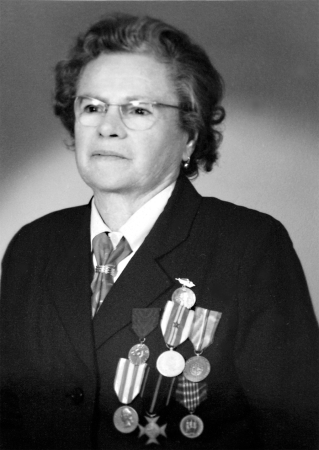
All of you who are dear to me…
Another story from the Small Fortress in Terezín are the life stories of Božena Kopová (1906–1987). In the database of the Terezín Memorial we can read the following: surname Kopová, name Božena, born on May 17, 1906 in Drozdov, date of the transfer to the Terezín penitentiary July 18, 1943, date of the end of imprisonment August 19, 1943, reason – transport to Auschwitz.
Božena Kopová was born in Drozdov, Beroun region, into the poor conditions of the Pech family. Her father Jan Pech was a labourer in Drozdov, mother Marie, born Nová, came from Chlustina and occasionally worked for farmers. Božena had many siblings. Some of them did not even know each other because of signifi cant age diff erences, and also because they left to serve in Vienna. In her memoires, Božena recalls her childhood: walking to school barefoot and being glad to have a piece of bare bread for a snack. During vacations, she had to tend to grazing geese which her mother was selling to be able to buy school clothes for her children. Božena fi nished eight years of the elementary school in Drozdov. To attend middle school, she would have to walk one and a half hours in any weather, which was not possible. Her adulthood came far too soon; Božena started working and had to care for herself. She got married, her husband Václav Kop was often unemployed, and they lived very modestly. The desire for ordinary social justice brought the husband and wife into the membership in the Communist Party of Czechoslovakia (1921). From the very beginning of the Nazi occupation Božena was an active member of the resistance group led by Gottlieb and Markup. She secretly distributed newspapers and fl yers, or collected money for the families whose breadwinner was in a concentration camp. However, her group was betrayed, Božena was arrested, and on May 9, 1943, she was transported to the Gestapo offi ce in Pilsen. Here she experienced brutal beating because she would not reveal her colleagues. In the Gestapo offi ce in Kladno, sabres were even used to beat her over legs. She kept a memory of these interrogations until her death – she became deaf in her left ear. She wrote her fi rst letters from the Gestapo offi ce in broken German, using small and relatively neat handwriting. The interrogations, torture, hunger, stress – all this started to slowly refl ect in her handwriting where the sweeping, badly legible words written more so by her strength of will indicated what she was experiencing. When the Gestapo “were done” with her, she received the RU label (Rückkehr unerwünscht – return undesirable) and, on July 18, 1943, she was transported to the Small Fortress in Terezín. Božena Kopová went through the Pilsen and Kladno Gestapo offi ces, the Small Fortress in Terezín, Auschwitz, Ravensbrück, the Barth concentration camp and she even survived the death march.
Memories of the Small Fortress in Terezín. “Once, SS Rojko (one of the most feared SS guards Stephan Rojko, author’s note) came to the cell, about 50 women were there, and started shooting among us. We had to get away from the door, and he beat every one of us with a truncheon. In the evening we saw the men – prisoners coming from work and the dead bodies of those who were beaten to death during the day by the SS were carried in the last row.” She recollects Auschwitz. “We lived in a block, and one day in the morning the SS came and we had to leave through the door one after another, and the SS took the women who were still young and pretty with them… Young girls were among them, almost children. The women whined because they knew where they were going and that they would eventually end up in the gas chamber anyway. When we were in the camp… we heard noise and screams during the night. We asked the block women what was happening and they said that the SS were selecting people for the chamber in the next block… I will never forget that day as long as I am alive.”
Božena Kopová returned home to Rokycany on June 12, 1945. She wrote about her liberation: “As big as our misery was, the joy of the last day of April, 1945 was so much greater. I will never stop being thankful to the Red Army that liberated us. After the liberation, we spent further six weeks in the town of Rybnice as the railways and bridges were broken. A bus from Prague came to pick us up and I returned to those who are dear to me.” She never again entered any of the former concentration camps.
Some inherit houses, cars, china… The father of Jana Časnochová-Vrzalová inherited from his aunt Božena Kopová a box full of the most horrendous memories – letters written from places where humiliation and misery held hands with death and where not a single one of us would ever wish to be.
Text Jana Časnochová-Vrzalová, upravil Luděk Sládek
Nesouhlas se zpracováním Vašich osobních údajů byl zaznamenán.
Váš záznam bude z databáze Vydavatelstvím KAM po Česku s.r.o. vymazán neprodleně, nejpozději však v zákonné lhůtě.